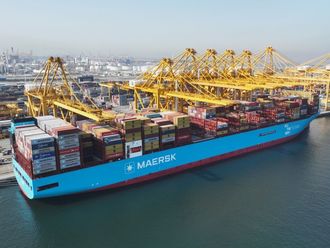London/Seoul: Oil pared its first weekly gain in a month as Libya sought to increase output and Russia ruled out military retaliation against Turkey for downing its jet near the Syrian border.
Futures fell as much as 2.6 per cent in New York. Libya said it’s making progress to resume crude production at two fields after more than a year including Sharara, the Opec member’s biggest. Russian President Vladimir Putin signalled his country will cooperate with the broader alliance against Islamic State after meeting his French counterpart in Moscow on Thursday.
Oil has slumped about 36 per cent in the past year as US crude inventories climbed to near a record and the Organisation of Petroleum Exporting Countries pumped above its quota to defend market share. Iran has said it will announce plans to expand output by 500,000 barrels a day when Opec members gather to discuss policy Dec. 4 in Vienna.
“The general feeling is Opec won’t change production levels and that can weigh on markets,” Michael Poulsen, oil risk manager at Global Risk Management Ltd. in Middelfart, Denmark, said by phone. “It could also make room for Iran and that will bring in additional volumes in the market.”
West Texas Intermediate for January delivery dropped as much as $1.12 to $41.92 a barrel on the New York Mercantile Exchange and was at $42.05 at 11.26am. London time. There was no settlement on Thursday because of the US Thanksgiving holiday. Prices have increased 4.2 per cent this week.
Libyan supply
Brent for January settlement was 34 cents lower at $45.12 a barrel on the London-based ICE Futures Europe exchange. The contract is up 1 per cent this week. Total volume was about 9.9 per cent below the 100-day average.
A Libyan committee has met to resolve issues that have shut export terminals and crude supply from Sharara and Elephant, according to Mustafa Sanalla, chairman of National Oil Corp. in Tripoli. The fields have a combined capacity of 440,000 barrels a day and could resume full production within seven days of a decision to restart operations, he said by phone Thursday. Libya, with Africa’s largest oil reserves, is exporting about 260,000 barrels a day.
“If Libya resumes oil production, it can be another factor that will add to the global supply glut,” Hong Sung Ki, a commodities analyst at Samsung Futures Inc. in Seoul, said by phone.
Geopolitical Dimension
While Russia began economic retaliation against Turkey in response to the shooting down of a Russian fighter jet near the Syrian border on Tuesday, it ruled out military action. Putin and French President Francois Hollande said the two sides would exchange information about which areas of Syria are controlled by the country’s moderate antigovernment groups.
The easing of military tensions is also probably contributing to the decline in oil on Friday even though “the geopolitical component of prices is still tiny,” Paul Horsnell, London-based head of commodities research at Standard Chartered Plc, said by email.
Societe Generale SA cut its 2016 Brent forecast as it expects the market’s rebalancing to accelerate during the second half of the year. Brent will trade at $53.75 a barrel next year, down 65 cents from its previous estimate, analysts including Michael Wittner said in an emailed report.












